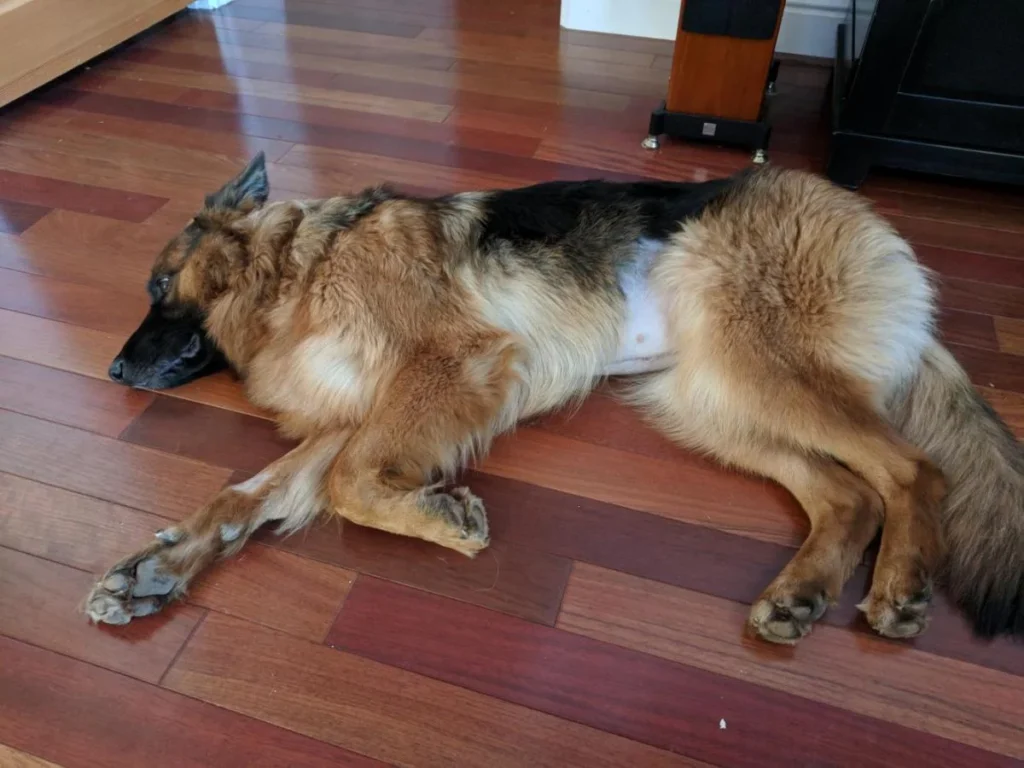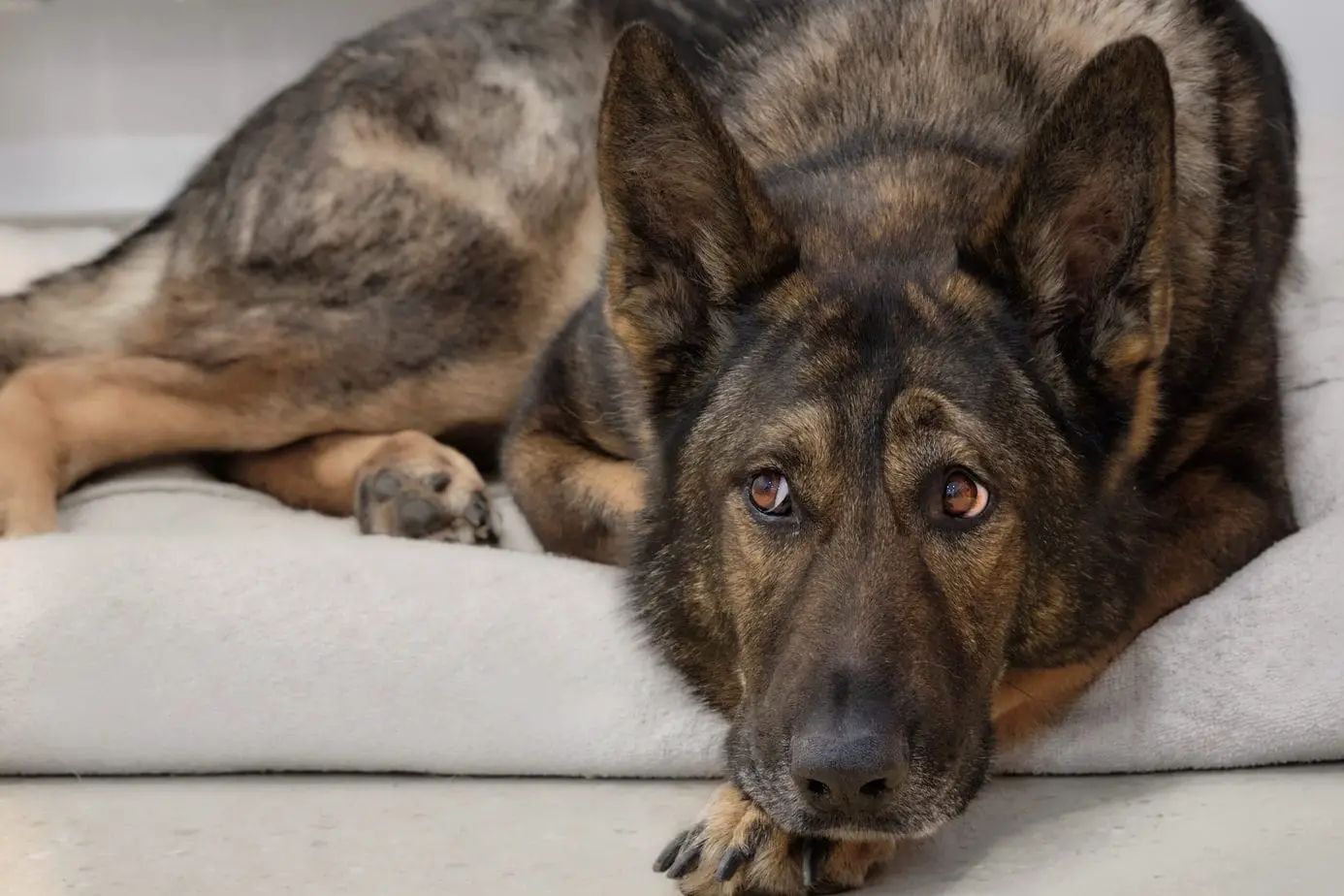When to Spay German Shepherd: Spaying German Shepherds between 6-12 months old is the best time to minimize their risk of mammary cancer and extend their lives, as well as avoid territorial marking and escape to look for a mate. This article covers the appropriate age range, risks of spaying too early or too late, benefits of physical and hormonal development after one heat cycle, and health and behavioral reasons.
German Shepherds can begin the first heat cycle at 6 months. Also, the best time to spay a German Shepherd is 6-12 months old. Spaying too early is hazardous to a dog’s development. Their reproductive organs are not fully grown yet and surgery can cause one some problems. Nevertheless, spaying beyond the first heat cycle, has additional risks and recovery time. Through one heat cycle, allowing the German Shepherd aids their hormonal and physical development. Moreover, undertaking extra heat cycles amplifies their likelihood of having mammary cancer in their later years. Consequently, most vets suggest neutering your German Shepherd dog between 6-12 months old. It not only minimizes their risk of mammary cancer and extends their lives but also avoids territorial marking and escape to look for a mate. Spaying as well eliminates a chance of false gestation and infections during their heat cycles, too.
The topics covered in the article are the appropriate age range for spaying German Shepherds, risks of spaying too early or too late, benefits of physical and hormonal development after one heat cycle, and health and behavioral reasons for spaying between 6-12 months. Please tell me if you want anything in the article to be changed or augmented.
Benefits of Spaying German Shepherds
Preventing Unwanted Pregnancies
Your German Shepherd gets de-spayed thus no more fears of unplanned and unexpected litters. An un spayed dog can go in heat and can be pregnant anytime if she is let out of confinement or mates with another dog. Spaying prevents overpopulation in animal shelters.
Reducing Risk of Certain Health Issues
Neutering your German Shepherd will diminish their probability of being contaminated for certain malignant growths or diseases. It almost makes it impossible to occur mammary tumors, which are carcinomas, that develop in the breast tissue. Intact female dogs have a 60% chance of getting mammary cancer in their lifetime. Spaying before their first heat in addition blocks the infections of the uterus and ovaries during the heat cycles. In the long run, it adds on to their life year by eliminating the possibility of paceble ailments.
Through spaying your German Shepherd between 6 to 12 months of age you will enjoy the benefits of preventing unwanted litters and certain health risks and provide for complete physical and hormonal development.
Ideal Age for Spaying German Shepherds
German Shepherds settle on a fantastic decision of sidekick in the event that you need a canine who is faithful and savvy. A basic decision for proprietors is choosing the best age for neutering their female German Shepherds. Such a choice impacts their wellbeing, conduct, and prosperity overall:
Variables to Consider:
- Health Considerations: Ideally, neutering German Shepherds should be carried out between 6 to 9 months. Spayed at this age diminishes the risk of mammary tumors and pyometra, the life-threatening infection of the uterus. But the procedure before six months may cause hip dysplasia and cranial cruciate ligament tears as orthopedic problems.
- Behavioral Considerations: Spaying can affect behavior by lessening the risk or eliminating completely the chance of unwanted pregnancy and the behaviors applicable to the estrus cycle (e.g. roaming, aggression). On the other hand, early spaying may decrease the ability of the puppy to socially develop and could develop/lead to some behavioral problems.
- Breeder or Rescue Recommendations: Notwithstanding whether a breeder or a rescue organization the case may be, their recommendation on spaying still tends to be influenced by personal experience or their findings. We should take their advice into consideration which will require us to consult a vet in order to make an informed decision.
- Individual Wellbeing and Improvement: Every German Shepherd is novel and factors like by and large wellbeing, size, and advancement ought to be thought about while deciding the ideal age for fix.
Behavioral Changes After Spaying
Fixing, which is the cautious departure of the female canine’s preventative organs, can achieve different sorts of lead changes in German Shepherds.
There are various advantages to this treatment, including sickness and pregnancy aversion, however apparently canines’ way of behaving can likewise be impacted in more than one way.

Frequently, spayed female German Shepherds display behavioral changes which involve reduction of hormonal behaviors such as aggression or territorial marking. Sterilization eliminates the estrus cycle related hormonal fluctuations which can lead to an elimination of aggressive responses exhibited towards other dogs and humans. Such can make the demeanor of neutered German Shepherds more quiet and more unsurprising.
Also, spaying decreases roaming behaviors in female dogs. German Shepherds in heat tend to wander more as they are looking for potential mates. The spaying on the other hand, reduces the heat cycle causing the dogs to exhibit this behavior less and thereby ensuring that German Shepherds stay close to home.
Even though spaying German Shepherds can lead to positive behavioral changes, one of the keys to having a well-adjusted and balanced companion is providing the dog with training and socialization. Besides, consultation with a veterinarian is a plentiful source of valuable advice on the post-operative care and behavioral changes after spaying.
Preparing for the Procedure
Consulting with a Veterinarian:
Prior to planning a method for your German Shepherd you should talk with a veterinarian that has a specialty on the variety. Wellbeing worries that are regular of German Shepherds ought to be considered before they go through a medical procedure. Your vet will do a general evaluation of your dog’s health, including any pre-existing conditions, and wouldn’t recommend the procedure unless the dog is found to be fit for it. Similarly, they will also offer you a thorough education about the risks and benefits peculiar to German Shepherds. You will also be well-informed and prepared because your veterinarian can address any breed-specific concerns and questions you may have about the procedure.
Pre-Surgery Preparations:
The next step is to decide to undergo the surgery, and then many preparations should be made to get your German Shepherd readied up for the procedure. It also involves keeping your dog food for a certain period before the procedure per the advice of your vet to minimize the chances of anesthesia issues. Pre-operative tests like blood work and X-rays, which look at the dog’s overall health and reveal any health issues that could affect the procedure, are also beneficial for this breed. A smooth and fruitful medical procedure of your German Shepherd can be ensured by keeping the rules from your vet and appropriately getting ready for the medical procedure.
Post-Surgery Care for German Shepherds
Recovery Period:
After medical procedure, German Shepherds require specific post-employable consideration to guarantee a quick recuperation. Create a calm, comfortable location where your German Shepherd can rest and heal during the recuperation phase. Follow your vet’s proposals concerning any recommended medicine, e.g., pain relievers or anti-toxins, and give them as needs be. Notice German Shepherds cautiously for any indications of torment as they would have a higher aggravation resistance. Further, your canine’s movement level ought to be restricted as encouraged by the veterinarian to forestall strain or injury to the careful site. Give simple admittance to food, water, and a happy dozing place, and give your German Shepherd? enough rest during that period.
Monitoring for Complications:
Although German Shepherds are well known for their versatility, cautious checking after a medical procedure is expected to distinguish any side effects of the difficulties. Observe cautiously the careful entry point site for indications of disease e.g., redness, enlarging and release. Watch your German Shepherd for loss of hunger, parchedness and indications of distress/sickness. Know about side effects like unnecessary licking or gnawing at the careful spot which might be indications of agony or bothering. Counsel your veterinarian immediately for extra assessment and guidelines in the event that your German shepherd shows any alarming signs or changes in its wellbeing. Through close observation of your German Shepherd and by giving mindful post-employable consideration you can help with having a fruitful recuperation and ideal result following a medical procedure.
FAQs
What is the right age to spay a German Shepherd?
There are a number of factors that influence the recommended age for spaying a German Shepherd: nonetheless, for the most part they are neutered somewhere in the range of 6 and 9 months old enough.
What risks come with spaying my German Shepherd?
Spaying operation is deemed to be safe but there are potential risks which include infection, anesthesia complications and surgical complications. However, these risks are (almost) negligible when the surgery is performed by a competent veterinarian.
Will spaying my German Shepherd change her behavior?
Spaying can cause slight behavioral changes like decrease in aggression, roaming behavior etc. On the other hand, such adjustments are mostly beneficial leading to a calmer and consistent personal behavior.
How should I prepare my German Shepherd for spaying surgery?
Talk with your veterinarian for explicit directions, yet by and large, you’ll have to quick your canine before the technique and guarantee she’s exceptional on immunizations and liberated from any fundamental medical problems.
What should I expect during the recovery period after spaying?
During the recuperation time frame, your German Shepherd will require a tranquil, agreeable climate to rest. Screen her intently for any indications of inconvenience or entanglements, and adhere to your veterinarian’s guidelines with respect to torment the board and movement limitations.
Related Read:
Conclusion
In sum, one must pay attention to all the factors while choosing the utmost age for German Shepherds spaying by taking into account their health, behavioral aspects, the breeders and rescues advises towards gets spayed or not and on certain condition by ignoring the generalized perspective of the whole decision While mostly considered that spaying between six to nine months reduces the risk of some issues like mammary tumors and pyometra, the potential benefits have to be weighed against the issues associated with early spaying, such as orthopedic ones.
Consulting with a veterinarian is crucial to ascertain the individual needs for each German Shepherd and make decisions which are based on the specific circumstances. Also, consider the breed-related features and consult with the respected breeders or rescue organizations to get information on the efficient techniques for spaying German Shepherds. Basically, the aim is to put the welfare of an individual dog first while considering the factors of population control and behavior. Considering these aspects and getting professional advice, owners decide when to have their German Shepherds spayed by weighing in the pros and cons.
